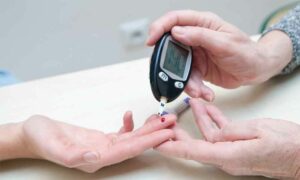Managing blood sugar levels is crucial for those living with diabetes to maintain their overall health and prevent complications. One of the first steps in diabetes management is understanding and choosing the right medication. This guide aims to provide comprehensive insights into first-line diabetes medications, helping patients and caregivers make informed decisions about their healthcare. We’ll explore the first-line diabetes medications available, how they work, and what you need to know before starting a treatment plan.
Contents
What Are The First-Line Diabetes Medications?
 First-line diabetes medications are those typically recommended as initial treatment options for managing diabetes, particularly Type 2 diabetes. These medications are chosen for their effectiveness in controlling blood sugar levels, safety profile, and the ability to reduce the risk of diabetes-related complications. Here are the main first-line medications for diabetes:
First-line diabetes medications are those typically recommended as initial treatment options for managing diabetes, particularly Type 2 diabetes. These medications are chosen for their effectiveness in controlling blood sugar levels, safety profile, and the ability to reduce the risk of diabetes-related complications. Here are the main first-line medications for diabetes:
Metformin
Metformin, commonly sold under brand names like Glucophage, is a cornerstone in treating Type 2 diabetes. It primarily works by reducing the amount of glucose the liver produces and improving the body’s sensitivity to insulin. This dual action helps to control blood sugar levels effectively. Metformin is particularly favored because it usually does not cause weight gain, a significant concern for many with Type 2 diabetes. It might even promote mild weight loss. However, some people may experience gastrointestinal side effects, especially when they first start taking the medication.
Sulfonylureas
This class of drugs includes medications like Glipizide (Glucotrol), Glyburide (Diabeta, Glynase), and Glimepiride (Amaryl). Sulfonylureas work by stimulating the beta cells in the pancreas to release more insulin. This increased insulin production helps lower blood glucose levels. They are effective and have been used for many years, making them a well-understood option for treating Type 2 diabetes. However, one of the main concerns with sulfonylureas is the risk of hypoglycemia or low blood sugar.
DPP-4 Inhibitors (Gliptins)
DPP-4 inhibitors include drugs like Sitagliptin (Januvia), Saxagliptin (Onglyza), and Linagliptin (Tradjenta). These medications work by blocking the enzyme dipeptidyl peptidase 4 (DPP-4). This blockage results in increased levels of incretin hormones, which help increase insulin production in response to meals and decrease the amount of glucose produced by the liver. They have the advantage of a low risk of causing hypoglycemia and are weight-neutral, meaning they do not typically cause weight gain or loss.
Thiazolidinediones (TZDs)
Pioglitazone (Actos) and Rosiglitazone (Avandia) are examples of TZDs. These drugs increase insulin sensitivity, making the body’s cells more responsive to insulin. They are particularly effective in managing insulin resistance, a common issue in Type 2 diabetes. However, TZDs have fallen out of favor to some extent due to their side effects. Due to these risks, they are not the first choice for everyone and are used with caution. Particularly in patients with a history of heart disease or at risk for bone loss.
SGLT2 Inhibitors
Examples of SGLT2 inhibitors include Canagliflozin (Invokana) and Empagliflozin (Jardiance). These medications work by preventing the kidneys from reabsorbing glucose back into the blood. This leads to the excretion of excess glucose in the urine. A significant benefit of SGLT2 inhibitors is that they not only help to control blood sugar levels but also promote weight loss and have been shown to have cardiovascular benefits. However, they can increase the risk of genital and urinary tract infections and, in rare cases, lead to a serious condition called diabetic ketoacidosis.
Insulin Therapy
Insulin therapy is the mainstay of treatment for Type 1 diabetes and is also used in Type 2 diabetes when blood sugar levels cannot be controlled with oral medications. There are various types of insulin, categorized by how quickly and how long they work. Examples include rapid-acting insulins like Insulin Lispro (Humalog) and Insulin Aspart (NovoLog), and long-acting insulins like Insulin Glargine (Lantus) and Insulin Detemir (Levemir). Insulin therapy requires careful monitoring of blood sugar levels and can be adjusted based on food intake, activity level, and other factors.
It’s important to note that the choice of medication depends on individual factors such as the patient’s overall health, blood sugar levels, potential side effects, and personal preferences. Hence, always consult with a healthcare provider for personalized medical advice and treatment plans.
Benefits Of First-Line Diabetes Medications
 First-line diabetes medications offer several key benefits. These are crucial in the management of diabetes, particularly Type 2 diabetes. Here are the common benefits to be aware of:
First-line diabetes medications offer several key benefits. These are crucial in the management of diabetes, particularly Type 2 diabetes. Here are the common benefits to be aware of:
- Improved Blood Sugar Control
These medications effectively lower blood glucose levels, which is fundamental in managing diabetes. By keeping blood sugar levels within a target range, they help in reducing symptoms of high blood sugar and prevent the long-term complications of diabetes.
- Reduced Risk of Complications
Consistently high blood sugar levels can lead to various complications, including heart disease, kidney damage, vision problems, and nerve damage. First-line diabetes medications help reduce the risk of these complications by maintaining better blood glucose control over time.
- Weight Management
Some first-line diabetes medications have a neutral effect on weight, while others may promote weight loss. This is particularly beneficial since weight management can be a significant challenge for individuals with diabetes, and maintaining a healthy weight can improve insulin sensitivity and overall health.
- Cardiovascular Benefits
Certain diabetes medications have been shown to offer cardiovascular benefits, reducing the risk of heart disease, which is commonly associated with diabetes.
- Improved Insulin Sensitivity
Some medications work by improving the body’s sensitivity to insulin, allowing the body to use its own insulin more effectively, which is particularly important in Type 2 diabetes.
- Convenience and Ease of Use
Many first-line diabetes medications are taken orally, which is convenient and easy for patients to adhere to. This ease of use can lead to better compliance with the treatment regimen, contributing to more effective management of the condition.
It’s important to remember that while these medications provide significant benefits, they are most effective when combined with lifestyle changes. Additionally, ongoing monitoring and adjustments in treatment may be necessary to achieve the best outcomes.
Lifestyle Changes For Diabetes Management
 Lifestyle changes play a crucial role in managing diabetes, often working in conjunction with medication to effectively control blood sugar levels and reduce the risk of complications. Adopting a healthier lifestyle can also improve overall well-being, enhance energy levels, and contribute to a better quality of life. Here are key lifestyle changes recommended for diabetes management:
Lifestyle changes play a crucial role in managing diabetes, often working in conjunction with medication to effectively control blood sugar levels and reduce the risk of complications. Adopting a healthier lifestyle can also improve overall well-being, enhance energy levels, and contribute to a better quality of life. Here are key lifestyle changes recommended for diabetes management:
Healthy Eating
- Adopting a balanced diet that’s rich in nutrients, low in fat and calories, and focused on whole foods is essential. This includes plenty of fruits, vegetables, whole grains, and lean protein.
- Portion control is also crucial to avoid overeating, which can lead to weight gain and affect blood sugar levels.
- Reducing the intake of refined sugars and carbohydrates, which cause rapid spikes in blood sugar, is beneficial.
- Consulting with a dietitian can help in creating a personalized eating plan that considers individual preferences and nutritional needs.
Regular Physical Activity
- Engaging in regular physical activity, such as brisk walking, swimming, or cycling, for at least 150 minutes per week is recommended.
- Exercise helps increase insulin sensitivity, meaning your body will use insulin more effectively.
- Physical activity also aids in weight management and reduces the risk of cardiovascular disease.
- It’s important to find activities that are enjoyable and sustainable in the long term.
Weight Management
- Maintaining a healthy weight is key in managing Type 2 diabetes. Even a modest amount of weight loss can improve insulin sensitivity and blood sugar levels.
- Weight management strategies should be realistic and include both dietary changes and regular physical activity.
Blood Sugar Monitoring
- Regularly checking blood sugar levels helps in understanding how different foods, activities, and medications affect glucose levels.
- Frequent monitoring is particularly important for those on insulin or medications that increase insulin production.
Stress Management
- Stress can affect blood sugar levels, so it’s important to find ways to relieve stress.
- Techniques such as deep breathing, yoga, meditation, or hobbies can be effective in managing stress.
Avoiding Harmful Habits
- Smoking cessation is crucial as smoking increases the risk of diabetes complications, including heart disease, stroke, nerve damage, and kidney disease.
- Limiting alcohol consumption is also important, as excessive drinking can lead to blood sugar fluctuations.
Making these lifestyle changes can be challenging. But they are highly effective in managing diabetes. Small, incremental steps towards healthier habits can lead to significant improvements in blood sugar control and overall well-being. It’s important to work closely with healthcare professionals to develop a management plan that is tailored to individual needs and circumstances.
Conclusion
In conclusion, first-line diabetes medications play a crucial role in controlling blood sugar levels, but they are most effective when combined with a healthy diet, regular exercise, and weight management. Monitoring blood sugar levels and managing stress are also key components of diabetes care. It’s important to remember that small, consistent changes in daily habits can make a significant impact on your overall health and well-being.
Always consult with healthcare professionals to tailor a diabetes management plan that works best for you. And remember that taking proactive steps in managing diabetes can lead to a healthier, more fulfilling life. Do you want to get rid of diabetes? Join our online diabetes treatment program and reverse Diabetes naturally through lifestyle changes such as a Personalized Diet plan, Exercise, Yoga, dieticians, and health coaches.

